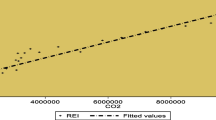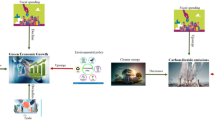Abstract
The present era faces adverse effects of the strides recorded in economic advancements of the prior generations thus leading the present generation to growth dilemma. Consequently, there is a conscientious consideration for the ecological effects of economic growth. To resolve the preceding issue, due consideration must be given to harmless growth of which eco-digitalization, green financing, green technology, energy transition, and regularity quality are key determinants. Despite the aforesaid importance, empirical studies advancing this nexus are scarce. Hence, this study contributes to environment empirics by providing empirical evidence for the impacts of the highlighted indicators on sustainable environment in the USA. The study explores quarterly data from 1996Q1 to 2019Q4 based on the novel non-linear autoregressive distributed lag (ARDL) model. The pretests’ outcomes show that long-run nexus exists among the variables, whereas the Zivot-Andrew uncovers breakpoint years in the observations. The main findings show that eco-digitalization, green financing, green technology, and renewable energy promote sustainable environment. On the flip side, non-renewable energy and regulatory quality hinder the pathways to sustaining the environment in the USA. Robustness analyses conducted based on FMOL, DOLS, and CCR provide substantial support and validity for the main results. Furthermore, the causality nexus lends empirical support for the existence of bidirectional and unidirectional causalities in the empirical model. Policy insights that drive the paths to sustainability in the US are suggested based on the findings.










Similar content being viewed by others
Data availability
The datasets used and analyzed during the current study are available from the corresponding author on reasonable request.
References
Adha R, Hong C-Y, Agrawal S, Li L-H (2022) ICT, carbon emissions, climate change, and energy demand nexus: the potential benefit of digitalization in Taiwan. Energy Environ 0958305X221093458. https://doi.org/10.1177/0958305X221093458
Afshan S, Ozturk I, Yaqoob T (2022) Facilitating renewable energy transition, ecological innovations and stringent environmental policies to improve ecological sustainability: evidence from MM-QR method. Renewable Energy 196:151–160. https://doi.org/10.1016/j.renene.2022.06.125
Ahmed Z, Ahmad M, Murshed M, Ibrahim Shah M, Mahmood H, Abbas S (2022) How do green energy technology investments, technological innovation, and trade globalization enhance green energy supply and stimulate environmental sustainability in the G7 countries? Gondwana Res 112:105–115. https://doi.org/10.1016/j.gr.2022.09.014
Anwar A, Sinha A, Sharif A, Siddique M, Irshad S, Anwar W, Malik S (2022) The nexus between urbanization, renewable energy consumption, financial development, and CO2 emissions: evidence from selected Asian countries. Environ Dev Sustain 24(5):6556–6576. https://doi.org/10.1007/s10668-021-01716-2
Bai J, Chen Z, Yan X, Zhang Y (2022) Research on the impact of green finance on carbon emissions: evidence from China. Econ Res-Ekonomska Istraživanja 0(0):1–20. https://doi.org/10.1080/1331677X.2022.2054455
Balcilar M, Usman O, Ike GN (2023) Operational behaviours of multinational corporations, renewable energy transition, and environmental sustainability in Africa: does the level of natural resource rents matter? Resour Policy 81:103344. https://doi.org/10.1016/j.resourpol.2023.103344
Bashir MF, Pan Y, Shahbaz M, Ghosh S (2023) How energy transition and environmental innovation ensure environmental sustainability? Contextual evidence from top-10 manufacturing countries. Renewable Energy 204:697–709. https://doi.org/10.1016/j.renene.2023.01.049
Cui J, Dai J, Wang Z, Zhao X (2022) Does environmental regulation induce green innovation? A panel study of Chinese listed firms. Technol Forecast Soc Chang 176:121492. https://doi.org/10.1016/j.techfore.2022.121492
Dogan E, Madaleno M, Taskin D, Tzeremes P (2022) Investigating the spillovers and connectedness between green finance and renewable energy sources. Renewable Energy 197:709–722. https://doi.org/10.1016/j.renene.2022.07.131
Dong F, Hu M, Gao Y, Liu Y, Zhu J, Pan Y (2022) How does digital economy affect carbon emissions? Evidence from global 60 countries. Sci Total Environ 852:158401. https://doi.org/10.1016/j.scitotenv.2022.158401
Dong F, Zhu J, Li Y, Chen Y, Gao Y, Hu M, Qin C, Sun J (2022) How green technology innovation affects carbon emission efficiency: evidence from developed countries proposing carbon neutrality targets. Environ Sci Pollut Res 29(24):35780–35799. https://doi.org/10.1007/s11356-022-18581-9
Gao P, Wang Y, Zou Y, Su X, Che X, Yang X (2022) Green technology innovation and carbon emissions nexus in China: does industrial structure upgrading matter? Front Psychol 13:951172. https://doi.org/10.3389/fpsyg.2022.951172
Huang Y, Zhang Y (2023) Digitalization, positioning in global value chain and carbon emissions embodied in exports: evidence from global manufacturing production-based emissions. Ecol Econ 205:107674. https://doi.org/10.1016/j.ecolecon.2022.107674
Ibrahim RL (2022) Beyond COP26: can income level moderate fossil fuels, carbon emissions, and human capital for healthy life expectancy in Africa? Environ Sci Pollut Res. https://doi.org/10.1007/s11356-022-21872-w
Ibrahim RL, Ajide KB (2022) Trade facilitation, institutional quality, and sustainable environment: renewed evidence from Sub-Saharan African countries. J Afr Bus 23(2):281–303. https://doi.org/10.1080/15228916.2020.1826886
Ibrahim RL, Al-mulali U, Ozturk I, Bello AK, Raimi L (2022) On the criticality of renewable energy to sustainable development: do green financial development, technological innovation, and economic complexity matter for China? Renewable Energy. https://doi.org/10.1016/j.renene.2022.08.101
Ibrahim RL, Ozturk I, Al-Faryan MAS, Al-Mulali U (2022d) Exploring the nexuses of disintegrated energy consumption, structural change, and financial development on environmental sustainability in BRICS: modulating roles of green innovations and regulatory quality. Sustain Energy Technol Assess 53:102529. https://doi.org/10.1016/j.seta.2022.102529
Ibrahim RL, Al-mulali U, Solarin SA, Ajide KB, Al-Faryan MAS, Mohammed A (2023) Probing environmental sustainability pathways in G7 economies: the role of energy transition, technological innovation, and demographic mobility. Environ Sci Pollut Res. https://doi.org/10.1007/s11356-023-27472-6
Ibrahim RL, Adebayo TS, Awosusi AA, Ajide KB, Adewuyi AO, Bolarinwa FO (2022) Investigating the asymmetric effects of renewable energy-carbon neutrality nexus: can technological innovation, trade openness, and transport services deliver the target for Germany? Energy Environ 0958305X221127020. https://doi.org/10.1177/0958305X221127020
Ibrahim RL, Huang Y, Mohammed A, Adebayo TS (2022) Natural resources-sustainable environment conflicts amidst COP26 resolutions: investigating the role of renewable energy, technology innovations, green finance, and structural change. Int J Sustain Dev World Ecol0(0):1–13. https://doi.org/10.1080/13504509.2022.2162147
International Energy Agency, I. E. A. (2020, March).Consumption – coal information: overview – analysis. IEA. https://www.iea.org/reports/coal-information-overview/consumption. Accessed Jul 2023
Lanre Ibrahim R, Bello Ajide K, Usman M, Kousar R (2022) Heterogeneous effects of renewable energy and structural change on environmental pollution in Africa: do natural resources and environmental technologies reduce pressure on the environment? Renew Energy 200:244–256. https://doi.org/10.1016/j.renene.2022.09.134
Murshed M, Apergis N, Alam MS, Khan U, Mahmud S (2022) The impacts of renewable energy, financial inclusivity, globalization, economic growth, and urbanization on carbon productivity: evidence from net moderation and mediation effects of energy efficiency gains. Renew Energy 196:824–838. https://doi.org/10.1016/j.renene.2022.07.012
Nosova S, Norkina A, Makar S, Arakelova I, Fadeicheva G (2022) Digitalization as a new paradigm of economic progress. Biologically Inspired Cogn Architectures 2021:344–354. https://doi.org/10.1007/978-3-030-96993-6_38
Oke DM, Ibrahim RL, Bokana KG (2021) Can renewable energy deliver African quests for sustainable development? J Dev Areas 55(1). https://doi.org/10.1353/jda.2021.0022
Onifade ST, Alola AA (2022) Energy transition and environmental quality prospects in leading emerging economies: the role of environmental-related technological innovation. Sustain Dev n/a(n/a). https://doi.org/10.1002/sd.2346
Pang L, Zhu MN, Yu H (2022) Is green finance really a blessing for green technology and carbon efficiency? Energy Econ 114:106272. https://doi.org/10.1016/j.eneco.2022.106272
Pesaran MH, Shin Y (1995) Autoregressive distributed lag modelling approach to cointegration analysis. DAE Working Paper Series No. 9514, Department of Economics, University of Cambridge, Cambridge
Rehman A, Ma H, Ozturk I, Ahmad MI (2022) Examining the carbon emissions and climate impacts on main agricultural crops production and land use: updated evidence from Pakistan. Environ Sci Pollut Res 29(1):868–882. https://doi.org/10.1007/s11356-021-15481-2
Sharif A, Saqib N, Dong K, Khan SAR (2022) Nexus between green technology innovation, green financing, and CO2 emissions in the G7 countries: the moderating role of social globalisation. Sustain Dev n/a(n/a). https://doi.org/10.1002/sd.2360
Shen J, Ridwan LI, Raimi L, Al-Faryan MAS (2023) Recent developments in green hydrogen–environmental sustainability nexus amidst energy efficiency, green finance, eco-innovation, and digitalization in top hydrogen-consuming economies. Energy Environ 0958305X231153936. https://doi.org/10.1177/0958305X231153936
Shin Y, Yu B, Greenwood-Nimmo M (2014) Modelling asymmetric cointegration and dynamic multipliers in a nonlinear ARDL framework. In R. C. Sickles & W. C. Horrace (Eds), Festschrift in honor of Peter Schmidt (pp 281–314). Springer New York. https://doi.org/10.1007/978-1-4899-8008-3_9
Tang L, Lu B, Tian T (2023) The effect of input digitalization on carbon emission intensity: an empirical analysis based on China’s manufacturing. Int J Environ Res Publ Health 20(4):4. https://doi.org/10.3390/ijerph20043174
Wang Z, Yen-Ku K, Li Z, An NB, Abdul-Samad Z (2022) The transition of renewable energy and ecological sustainability through environmental policy stringency: estimations from advance panel estimators. Renewable Energy 188:70–80. https://doi.org/10.1016/j.renene.2022.01.075
Yang Z, Gao W, Han Q, Qi L, Cui Y, Chen Y (2022) Digitalization and carbon emissions: how does digital city construction affect China’s carbon emission reduction? Sustain Cities Soc 87:104201. https://doi.org/10.1016/j.scs.2022.104201
Zhao J, Sinha A, Inuwa N, Wang Y, Murshed M, Abbasi KR (2022) Does structural transformation in economy impact inequality in renewable energy productivity? Implications for sustainable development. Renew Energy 189:853–864. https://doi.org/10.1016/j.renene.2022.03.050
Zheng R, Wu G, Cheng Y, Liu H, Wang Y, Wang X (2023) How does digitalization drive carbon emissions? The inverted U-shaped effect in China. Environ Impact Assess Rev 102:107203. https://doi.org/10.1016/j.eiar.2023.107203
Zou X, Yang S, Ibrahim RL, Al-Faryan MAS (2023) Probing the environmental impacts of structural transition and demographic mobility in Africa: does technological innovation matter? Energy Environ 0958305X231153967. https://doi.org/10.1177/0958305X231153967
Author information
Authors and Affiliations
Contributions
Conceptualization (ideas; formulation or evolution of overarching research goals and aims: Fangbin Han, Ridwan Lanre Ibrahim, Usama Al-Mulali, and Jun Tang. Methodology (development or design of methodology; creation of models): Ridwan Lanre Ibrahim, Fangbin Han, and Jun Tang. Software (programming, software development; designing computer programs; implementation of the computer code and supporting algorithms; testing of existing code components): Ridwan Lanre Ibrahim, Fangbin Han, and Jun Tang. Validation (verification, whether as a part of the activity or separate, of the overall replication/ reproducibility of results/experiments and other research outputs): Ridwan Lanre Ibrahim, Fangbin Han, Usama Al-Mulali, and Jun Tang. Formal analysis (application of statistical, mathematical, computational, or other formal techniques to analyze or synthesize study data): Ridwan Lanre Ibrahim, Fangbin Han, and Jun Tang. Investigation (conducting a research and investigation process, specifically performing the experiments, or data/evidence collection): Ridwan Lanre Ibrahim, Fangbin Han, Usama Al-Mulali, and Jun Tang. Resources (provision of study materials, reagents, materials, patients, laboratory samples, animals, instrumentation, computing resources, or other analysis tools): Ridwan Lanre Ibrahim, Fangbin Han, and Jun Tang. Data curation (management activities to annotate (produce metadata), scrub data, and maintain research data (including software code, where it is necessary for interpreting the data itself) for initial use and later reuse): Ridwan Lanre Ibrahim, Fangbin Han, and Jun Tang. Writing — original draft (preparation, creation and/or presentation of the published work, specifically writing the initial draft (including substantive translation): Ridwan Lanre Ibrahim, Fangbin Han, Usama Al-Mulali, and Jun Tang. Writing — review and editing (preparation, creation and/or presentation of the published work by those from the original research group, specifically critical review, commentary or revision — including pre-or post-publication stages): Ridwan Lanre Ibrahim, Fangbin Han, Usama Al-Mulali, and Jun Tang. Visualization (preparation, creation and/or presentation of the published work, specifically visualization/data presentation): Fangbin Han, Ridwan Lanre Ibrahim, and Usama Al-Mulali. Supervision (oversight and leadership responsibility for the research activity planning and execution, including mentorship external to the core team): Usama Al-Mulali and Ridwan Lanre Ibrahim. Project administration (management and coordination responsibility for the research activity planning and execution): Ridwan Lanre Ibrahim. Funding acquisition (acquisition of the financial support for the project leading to this publication): not applicable.
Corresponding author
Ethics declarations
Ethics approval
Not applicable.
Consent to participate
Not applicable.
Consent for publication
Not applicable.
Competing interests
The authors declare no competing interests.
Additional information
Responsible Editor: Ilhan Ozturk
Publisher's note
Springer Nature remains neutral with regard to jurisdictional claims in published maps and institutional affiliations.
Rights and permissions
Springer Nature or its licensor (e.g. a society or other partner) holds exclusive rights to this article under a publishing agreement with the author(s) or other rightsholder(s); author self-archiving of the accepted manuscript version of this article is solely governed by the terms of such publishing agreement and applicable law.
About this article
Cite this article
Han, F., Ibrahim, R.L., Tang, J. et al. Do the asymmetric effects of eco-digitalization amidst energy transition make or mar the strides toward environmental sustainability in the USA?. Environ Sci Pollut Res 30, 123412–123426 (2023). https://doi.org/10.1007/s11356-023-31007-4
Received:
Accepted:
Published:
Issue Date:
DOI: https://doi.org/10.1007/s11356-023-31007-4




